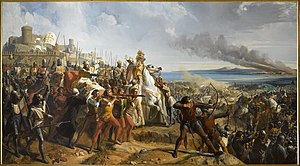Battle of Montgisard
| Battle of Montgisard | |||||||
|---|---|---|---|---|---|---|---|
| Part of Crusades | |||||||
 The Battle of Montgisard, 1177, by Charles Philippe Larivière |
|||||||
|
|||||||
| Belligerents | |||||||
|
|
|
||||||
| Commanders and leaders | |||||||
|
Baldwin IV of Jerusalem Odo de St Amand Raynald de Châtillon |
Saladin | ||||||
| Strength | |||||||
| 500 templar knights , 4,000 infantry |
8,500-26,000 | ||||||
| Casualties and losses | |||||||
| 1,100 killed 750 wounded |
10,000 | ||||||
The Battle of Montgisard was fought between the Ayyubids and the Kingdom of Jerusalem on November 25, 1177. The 16-year-old King Baldwin IV, seriously afflicted by leprosy, led an out-numbered Christian force against the army of Saladin. The Arab force was routed and their casualties were massive, and only a fraction managed to flee to safety.
In 1177, King Baldwin IV, and Philip of Alsace who had recently arrived on pilgrimage, planned an alliance with the Byzantine Empire for a naval attack on Egypt; but none of these plans came to fruition.
Meanwhile, Saladin planned his own invasion of the Kingdom of Jerusalem from Egypt. Learning of Saladin's plans, Baldwin IV left Jerusalem with, according to William of Tyre, only 375 knights to attempt a defense at Ascalon, but Baldwin was stalled there by a detachment of troops sent by Saladin, who, again according to William of Tyre, had 26,000 men. The true numbers are impossible to estimate, since the Christian sources refer only to knights and give no account of the number of infantry and turcopoles, except that it is evident from the number of the dead and wounded that there must have been more men than the 375 "knights". It is also uncertain whether the so-called knights included mounted sergeants or squires, or whether they were true knights. Just as uncertain are the numbers of their opponents. An 1181 review listed Saladin's Mamluk forces at 6,976 Ghulams and 1,553 Qaraghulams.
However, there would have been additional soldiers available in Syria and elsewhere, while auxiliaries might have accompanied the Mamluks. Whether these would have added up to a total of 26,000 reported by William of Tyre is impossible to say. Saladin left part of his army to besiege Gaza and a smaller force at Ascalon and marched northward with the rest. Accompanying Baldwin was Raynald of Châtillon, lord of Oultrejordain, who had just been released from captivity in Aleppo in 1176. Raynald was a fierce enemy of Saladin and was King Baldwin's second-in-command. Also with the army were Baldwin of Ibelin, his brother Balian, Reginald of Sidon, and Joscelin III of Edessa. Odo de St Amand, Master of the Knights Templar, came with 84 Templar knights. Another Templar force attempted to meet Baldwin at Ascalon, but they remained besieged at Gaza.
...
Wikipedia
